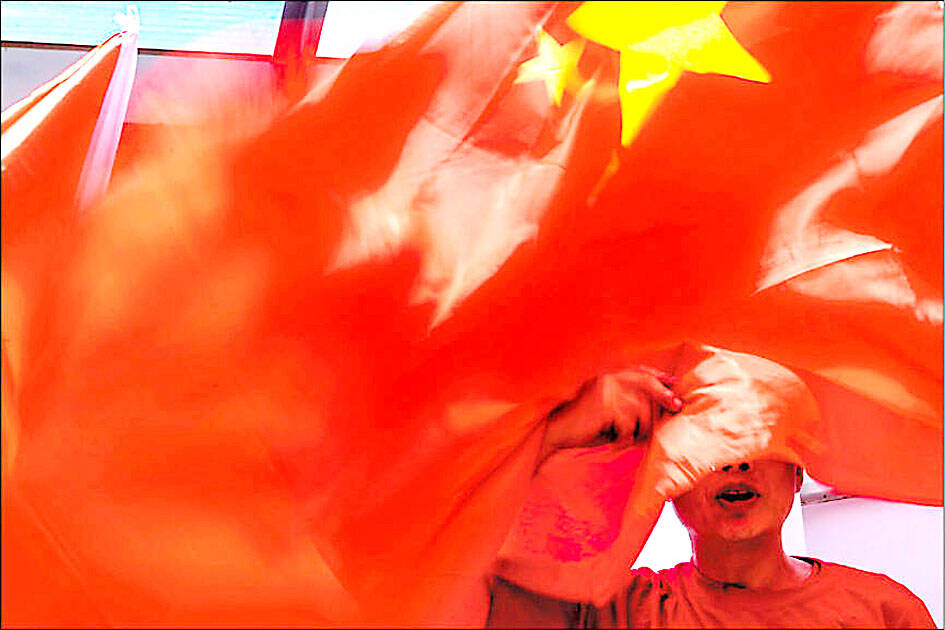Reports of Taiwanese going missing, being detained or interrogated, or having their personal liberties restricted in China have surged this year, Mainland Affairs Council (MAC) Minister Chiu Chui-cheng (邱垂正) said in an interview yesterday.
A total of 133 cases had been reported to the Straits Exchange Foundation or the MAC as of Aug. 31, up from 55 in the whole of last year, Chiu said.
The MAC’s latest data as of Tuesday showed that since the start of last year 61 Taiwanese had lost contact after traveling to China, while 19 had been detained or interrogated by the Chinese government.

Photo: Bloomberg
Meanwhile, 132 had been restricted in personal freedom, including 93 for being allegedly involved in fraud cases, 25 for alleged involvement in other criminal offenses, 13 for allegedly engaging in religious activities and one for alleged involvement in a national security case.
The cases can be divided into three categories: “missing,” “detained” and “interrogated, with personal liberty restricted” by the Chinese Communist Party, especially through the use of Chinese criminal law, he said.
The number of cases has increased by about 20 each month since last year, he said.
A travel alert for China, Hong Kong and Macau was upgraded to “orange” in June last year, Chiu said, urging Taiwanese to carefully evaluate trips there and register their itineraries on the council’s online platform, which was launched in April.
Asked when tourism from China to Taiwan would resume, Chiu said that the MAC aims to restore cross-strait tourism after a five-year halt.
Authorities on both sides of the Taiwan Strait should communicate on tourism safety issues, he said.
China should restart talks on travel safety, quality, stability and fairness through the Taiwan Strait Tourism Association and the Association for Tourism Exchange Across the Taiwan Straits, he added.
The associations were established by Taipei and Beijing respectively to facilitate tourism coordination.
Additional reporting by CNA and Shelley Shan
This story has been amended since it was first published.

CHAOS: Iranians took to the streets playing celebratory music after reports of Khamenei’s death on Saturday, while mourners also gathered in Tehran yesterday Iranian Supreme Leader Ayatollah Ali Khamenei was killed in a major attack on Iran launched by Israel and the US, throwing the future of the Islamic republic into doubt and raising the risk of regional instability. Iranian state television and the state-run IRNA news agency announced the 86-year-old’s death early yesterday. US President Donald Trump said it gave Iranians their “greatest chance” to “take back” their country. The announcements came after a joint US and Israeli aerial bombardment that targeted Iranian military and governmental sites. Trump said the “heavy and pinpoint bombing” would continue through the week or as long

TRUST: The KMT said it respected the US’ timing and considerations, and hoped it would continue to honor its commitments to helping Taiwan bolster its defenses and deterrence US President Donald Trump is delaying a multibillion-dollar arms sale to Taiwan to ensure his visit to Beijing is successful, a New York Times report said. The weapons sales package has stalled in the US Department of State, the report said, citing US officials it did not identify. The White House has told agencies not to push forward ahead of Trump’s meeting with Chinese President Xi Jinping (習近平), it said. The two last month held a phone call to discuss trade and geopolitical flashpoints ahead of the summit. Xi raised the Taiwan issue and urged the US to handle arms sales to

BIG SPENDERS: Foreign investors bought the most Taiwan equities since 2005, signaling confidence that an AI boom would continue to benefit chipmakers Taiwan Semiconductor Manufacturing Co’s (TSMC, 台積電) market capitalization swelled to US$2 trillion for the first time following a 4.25 percent rally in its American depositary receipts (ADR) overnight, putting the world’s biggest contract chipmaker sixth on the list of the world’s biggest companies by market capitalization, just behind Amazon.com Inc. The site CompaniesMarketcap.com ranked TSMC ahead of Saudi Aramco and Meta Platforms Inc. The Taiwanese company’s ADRs on Tuesday surged to US$385.75 on the New York Stock Exchange, as strong demand for artificial intelligence (AI) applications led to chip supply constraints and boost revenue growth to record-breaking levels. Each TSMC ADR represents

Pro-democracy media tycoon Jimmy Lai’s (黎智英) fraud conviction and prison sentence were yesterday overturned by a Hong Kong court, in a surprise legal decision that comes soon after Lai was jailed for 20 years on a separate national security charge. Judges Jeremy Poon (潘兆初), Anthea Pang (彭寶琴) and Derek Pang (彭偉昌) said in the judgement that they allowed the appeal from Lai, and another defendant in the case, to proceed, as a lower court judge had “erred.” “The Court of Appeal gave them leave to appeal against their conviction, allowed their appeals, quashed the convictions and set aside the sentences,” the judges